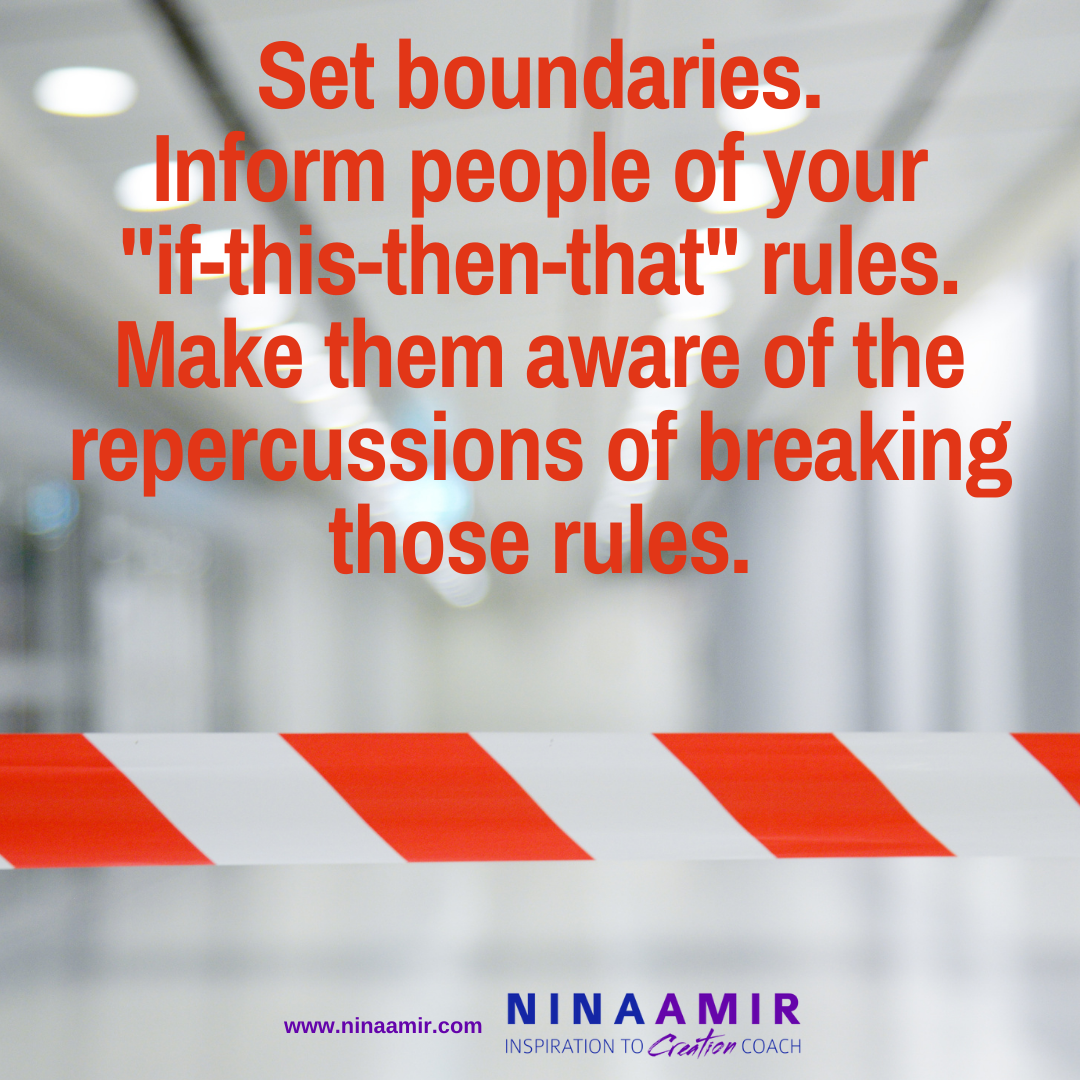Setting boundaries comes naturally to some people. To others, not so much… And while some find boundaries limiting, others experience them as enormously freeing.
Which camp do you fall into?
A boundary is typically defined as a line that marks the limits of an area, subject, or sphere of activity. Thus, it’s a dividing mark or an endpoint. You might also see it as a wall, barrior, or fence.
Boundaries are Useful
Boundaries are enormously helpful. This is especially true in relationships, but they serve an essential purpose in your life generally, too.
When you set a boundary, you clearly tell yourself and others about your limits. You indicate the specific treatment you are unwilling to accept. Then, when you share a boundary with someone, that person knows where you have drawn a line and can avoid crossing it—and suffering the ramifications of doing so.
Additionally, boundaries make it (sometimes painfully) apparent to you when someone crosses a line you have drawn. Crossing that line could indicate a relationship or job needing to end or for you to take a different action, like reducing your contact with someone or changing your eating habits.
Unclear Boundaries are Problematic
Unfortunately, too many of us fail to set clear boundaries. As a result, it can feel challenging to delineate when it is time for change or repercussions.
Unclear boundaries prove problematic. If you don’t know where the line is, how can you tell someone crossed it? And if you don’t even know where the line is, how can anyone else recognize it?
Typically, even if you don’t set a boundary, you know when it has been violated. At that moment, you become aware there was one and might say, “Wow! That person really crossed the line!”
At that point, you feel differently about the person. And crossing the line initiates a response or result of some type, like unfriending someone on Facebook.
Boundaries for all Occasions
You can set boundaries for all sorts of situations or occasions. In each case, setting them helps you clarify your limits. On the other hand, it can inform and warn someone that you have a limit.
For instance, you might set a personal boundary related to reaching a weight of 180 pounds. At that point, you know it’s time to start a diet.
Or you might tell your partner, “If you get drunk again, I am moving out.”
You might set a boundary before a family gathering. For example, “If my sister goes on one of her tirades, I will tell her I am unwilling to listen and leave the room.”
Or you could share that boundary before the event: “I want you to know that if you begin criticizing me, I will simply walk out of the room. I am no longer willing to listen to you judge my choices.”
If-This-Then-That Rules
Basically, boundaries are if-this-then-that rules. The basic principle of if-this-then-that rules is that when one thing happens, it automatically make something else happen. So, for example, when I flip the wall light switch upward, the room light automatically turns on.
In computer language, you might say it this way: input determines output.
Those of us who are parents often set if-this-then-that rules for our children. For instance, we tell them, “If you don’t do your homework, you won’t be allowed to watch television.” Or “If you stay out past curfew, you will be grounded for a week.”
But adults need boundaries, too. When you set boundaries, you inform the people in your life of your if-this-then-that rules. You make them aware of your limits and the repercussions of going beyond them.
Keep Your Word
Setting boundaries prevents anyone from feeling surprised when you enforce the consequence for breaking the boundary. And you have no reason to defend yourself for doing what you said you would do. You are simply following your if-this-then-that rule.
But therein lies the rub… You must do what you said you would do when the line gets crossed. But, unfortunately, too often, people don’t uphold the boundary.
Consequences Matter
I get it! I was at fault for not doing what I said I would do when my kids crossed the line. They still got to watch television or go out with friends—despite crossing the line.
Why? Because it was easier for me to not enforce the “consequence” or “punishment.” (Who wants to listen to whining children or be home with angry teens, right?)
As an adult, you may not follow through and be self-integral because it feels easier, safer, or more comfortable. I get that, too! I can think of at least a few relationships where I have sent boundaries but lacked the self-integrity to follow through.
You also may not enforce the consequences of breaking through a boundary because of fear. What might happen if you follow through? How will people react? Will you be okay?
Additionally, low levels of confidence can stop you from enforcing your if-this-then-that rule. You have to be willing and able to stand up for yourself and your need for boundaries. Lack of confidence keeps you from taking bold action.
Even lack of self-love will keep you from following through. After all, boundaries are all about loving yourself enough to take care of your wellbeing.
The reason you don’t follow through doesn’t matter. What matters is this: If you don’t follow through, you render the boundary useless. In fact, you make it nonexistent.
That means nothing changes.
Plus, you will feel horrible about yourself. In fact, your lack of integrity will lower your level of self-esteem and self-confidence, making it even harder to follow through the next time.
4 Steps to Successful Boundaries
To create boundaries, you need only take three simple steps.
1. Determine the boundaries you want to set. Clarify the lines you are not willing to cross or have others cross.
2. Decide what happens if that line gets crossed. You must know the result or repercussion of crossing the line. This is where you set the if-this-then-that rule. What will you do if the boundary is not upheld?
3. Share your boundary. If the boundary is related to how you treat yourself, then you are all set. But, more often than not, your boundaries will relate to other people. Therefore, you need to let them know you’ve drawn a line. Otherwise, they won’t be aware that you have asked them to adhere to the boundary. Nor will they know what will happen if they don’t. Therefore, boundaries are most effective when everyone concerned knows they are in place.
4. Stick to your word. Be self-integral. Follow through even if doing so feels difficult or uncomfortable. Then, when the line gets crossed, implement the consequence.
Boundaries help you put limits on how people speak to you, behave around you, and treat you. These are good reasons to set some, are they not?
What boundaries do you need to set? Tell me in a comment. And please share this blog post with a friend who might benefit from reading it.
Never miss one of my videos! Click here to subscribe to my YouTube channel.
 Ready to make some progress on your transformational journey? Join the Inspired Creator Community. As a member, you will discover how to change from the inside out. Finally, be the person who does the things that allow you to create what you desire. Gain access to a world-class Certified High Performance Coaching program, a proprietary Inspired Results Coaching program, Author Coaching, and strategies for living a life that feeds your soul. As you will discover, you are a powerful creator. It’s time to create what you want, is it not?
Ready to make some progress on your transformational journey? Join the Inspired Creator Community. As a member, you will discover how to change from the inside out. Finally, be the person who does the things that allow you to create what you desire. Gain access to a world-class Certified High Performance Coaching program, a proprietary Inspired Results Coaching program, Author Coaching, and strategies for living a life that feeds your soul. As you will discover, you are a powerful creator. It’s time to create what you want, is it not?
.



Great article on boundaries! Very good points to follow! Now I have a clear idea of
the importance of declaring them when necessary, the repercussions that follow, and most importantly following up on such actions. Now it’s all up to me! Thank you!
Thanks for your comment, Ron! Let me know how setting…and keeping…boundaries work for you!